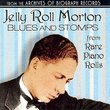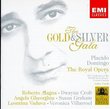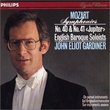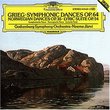| All Artists: Carl Orff, Igor Stravinsky, Leopold Stokowski, Houston Symphony, Berlin Philharmonic Title: Orff: Carmina Burana / Stravinsky: Firebird Suite Members Wishing: 0 Total Copies: 0 Label: EMI Classics Release Date: 3/15/1994 Genre: Classical Styles: Opera & Classical Vocal, Historical Periods, Modern, 20th, & 21st Century Number of Discs: 1 SwapaCD Credits: 1 UPC: 724356520721 |
Search - Carl Orff, Igor Stravinsky, Leopold Stokowski :: Orff: Carmina Burana / Stravinsky: Firebird Suite
 | Carl Orff, Igor Stravinsky, Leopold Stokowski Orff: Carmina Burana / Stravinsky: Firebird Suite Genre: Classical
|
Larger Image |
CD DetailsSimilar CDsSimilarly Requested CDs
|
Member CD ReviewsReviewed on 8/7/2006... Includes several page insert explaining the background and history of the "Cantationes Profanae".
CD ReviewsPacing is Crucial D. S. Nelson | White Plains, New York | 08/16/2001 (5 out of 5 stars) "Of all the recordings (and live performances) I have heard of the Carmina, this one flows the best. Conductors are always varying pace & tempo in this work, but Stowkowski got it just right. The harmonic coloring and gender-moods are also excellent. This is the one to own." Stokowski Finds What Many Don't Andre Gauthier | 09/12/2007 (4 out of 5 stars) "There's more than one reason that I don't give this recording 5 stars; the first being the Houston Symphony Chorale. It is a fine amateur group for the time, but they really don't have the sort of sound that would make this the grand performance it should be. "Carmina Burana" requires a super-chorus to be first class, and this sounds at best like a good college glee club. However, they do sing in tune most of the time and the accents are not Texan! The over all performance is one of real interest. Right from the opening where Stokowski cuts short the ends of the opening phrases in the chorus, you know the conductor is special. The Houston Symphony is actually in better form than is the Berlin Philharmonic, also on this recording; (more on that in a moment.) and is particularly fine and up to the task. For 1958 the original engineers manage a first class recording although the choice of mics, which is mentioned in the booklet, is a bit on the old side of the fence. There were newer mics available at that point, such as the Neumann M50 which would have given a much richer sound to the entire Houston recording. It is interesting that this is one of the first 3 track stereo recordings, and the remastering is excellent too. While not as lush as a version with a major chorus, this has plenty to offer, and the soloists are quite good. They were all local singers, although Guy Gardner went on to sing in Europe for some time. His Baritone voice may not be the ultimate for this staggering part, but then Clyde Hager and Verginia Babikian are quite fine in their tenor and soprano parts, respectively.
The "Firebird" of Stravinsky fills out the recording. There are some real problems from many fronts facing this piece in this incarnation. By itself it would get 3 stars at most. First the Berlin Philharmonic brass and winds do not play up to the high standard that was to become their hall mark just a decade later. (This was done in 1957.) I am reminded of a recording of a Bruckner symphony from the same era but with Eugen Jochum. The brass is just as sloppy with him as they seem to be with Stokowski. Also, I could be wrong about this, but there seems to be some stretching or wobbling in the tape itself. There is a long reverberation that has a sort of tremolo to it. That might be on the original recording, but I wish it weren't there. It's not found on any other version of Firebird that I have. The recording just isn't as secure sounding as it might have been. It was made in a church that is too reverberant for Stravinsky's orchestration and frankly it is one of the few times that Stokowski doesn't seem to find the "big bang" at the end. There is noticable lowering and raising of faders "on the fly", done by the producer and engineer I assume. This can't be fixed by remastering in most cases because the tape is straight to two track. The Finale has some oveload in the large chords, something that couldn't be helped with the playback equipment of the time. Some great moments are realized by Stowkowski, but I wonder why he only recorded with them at these sessions and never again. Could the mistakes I hear be a result of "discomfort" between the orchestra and the conductor? It was originally paired with the "Patroucka Suite" with the same orchestra. They were the only two pieces I can find listed that he did record with Berlin. Some of the effects, as I said, are stupendous but the sound from an EMI team is completely different from the Houston recordists that it is quite shocking to hear Carmina followed by this Firebird. Still, for the Orff it is worth owning no matter what. " |

 Track Listings (31) - Disc #1
Track Listings (31) - Disc #1










